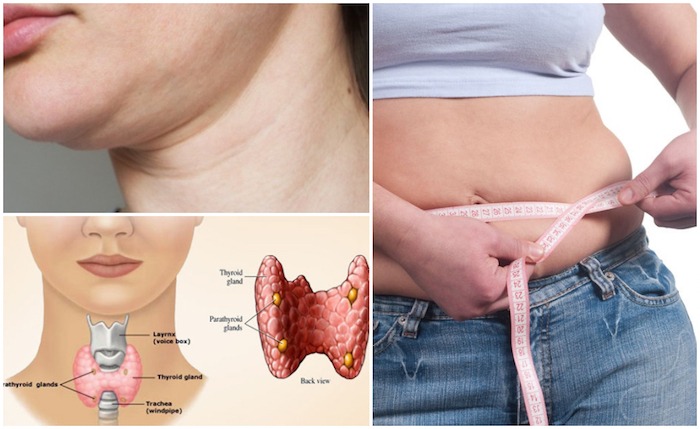When someone has difficulty losing weight in spite of eating healthy and exercising, a doctor would most certainly suggest getting a thyroid panel done, which comprises of TSH (thyroid stimulating hormone), total T4, free T4, T3, free T3, Tg, among other battery of tests to ascertain underlying factors and to treat the problem accordingly. If your thyroid tests return with TSH reading going above 4.0/mU/L with a low T4 level, it indicates a disease called “hypothyroidism,” which is a condition where the thyroid hormone is underactive and does not produce enough thyroid hormones to regulate metabolism. That means that there is a major slowing down of a lot of bodily functions due to under-production of thyroid hormones. In this post, we will delve deeper into how hypothyroidism causes weight gain and how to deal with such a condition.


What is Thyroid Gland?
The thyroid gland is a butterfly-shaped organ with two lobes, located at the base of the front of the neck, with each lobe on each side of the wind pipe. Thyroid is an endocrinal gland which makes the thyroid hormones T3 and T4. The production of these hormones is regulated by TSH (thyroid stimulating hormone), which is made by the pituitary gland. When there is an under-production of T3 (triiodothyronine) and T4 (thyroxine) body’s metabolism is affected and no matter what, you would feel tired and fatigued through the day, along with a host of other symptoms.

Symptoms of Hypothyroidism:
- Weight gain/difficulty in losing weight.
- Constipation.
- Puffy face and neck area.
- Depression
- Changes in menstrual cycle, heavy periods.
- Increased sensitivity to cold.
- Enlarged thyroid gland at the base of the neck.
- Fatigue, feeling tired through the day.
- Depression.
- Low energy.
- Muscle weakness.
- Brittle fingernails.
- Muscle and joint pain.
- Difficulty focusing and concentrating.
- Swollen legs.
- Hair fall, bald patches on the scalp.
What Causes Hypothyroidism?
Hypothyroidism is a condition where there is malfunctioning of the thyroid gland because there is not enough stimulation from the thyroid stimulating hormone (TSH) which is released from the pituitary gland, which in turn is controlled thoroughly by the hypothalamus part of the brain. Following are some of the reasons that can cause hypothyroidism:
1. Hashimoto’s disease: It’s an autoimmune disorder where the body’s immune system targets and attacks its own cells and organs, even the thyroid hormone, leading to malfunctioning of the thyroid gland.
2. Certain medications can cause hypothyroidism.
3. Malfunctioning of pituitary gland which produces TSH which is needed for stimulation of thyroid gland.
4. Iodine deficiency in diet.
5. Inflammation of the thyroid gland.
6. Surgery where there is complete or partial removal of the thyroid gland.
7. Radiation exposure.
What’s the Link Between Hypothyroidism and Weight Gain?
People who suffer from hypothyroidism find it extremely difficult to lose weight despite following a strict diet routine and indulging in optimum physical activity. The thyroid gland is responsible for regulating metabolism and if there is under-activity in the production of thyroid hormones, the metabolism will automatically become sluggish and slow down which means you would not be able to effectively burn calories or fat. Low thyroid hormone levels bring down the basal metabolic rate or resting metabolic rate which directly affects the burning of calories. Excessive weight gain in hypothyroidism can also be due to increased salt and water accumulation in the body. You can lose up to 10% of your body weight after treating hypothyroidism.
Difference Between Hyperthyroidism and Hypothyroidism:
1. Hyperthyroidism: Hyperthyroidism is a condition where the thyroid gland is overactive leading to excessive production of thyroid hormones. In hyperthyroidism, FT3 and FT4 levels are elevated. Hyperthyroidism is characterized by hair loss, enlarged thyroid gland, weight loss, mood swings, hand tremors, and breathing problems among a host of other symptoms.
2. Hypothyroidism: It’s a condition where the thyroid hormone is underactive and does not produce enough thyroid hormones to regulate metabolism. That means that there is a major slowing down of a lot of bodily functions due to under-production of thyroid hormones. This condition is characterized by weight gain/difficulty to lose weight, hair loss, hair thinning, sensitivity to cold, infertility issues, etc.
Treatment of Hypothyroidism:
1. Thyroid hormone replacement therapy is usually suggested by the doctor. A qualified doctor usually determines the course of action and dosage after going through the thyroid panel or test.
2. Cut down on soy products.
3. Cut down on cruciferous vegetables (cauliflower, cabbage, etc.)
4. Use iodized salt for cooking.
How to Stop Thyroid Hair Loss
Best Foods for People Suffering with Hypothyroidism





